With over 1.54 million apps in Apple’s App Store, getting your app to stand out isn’t just about having a polished product anymore. It’s about strategically optimizing every aspect of your app’s presence using data, and AI presents a powerful opportunity for insights into further enhancement of your app listing.
Whether you’re improving your application before you go to market or looking for ways to enhance an app already in the store, data insights derived from AI are a resource that can dramatically improve your app store optimization (ASO) strategy.
How Does ASO Work?
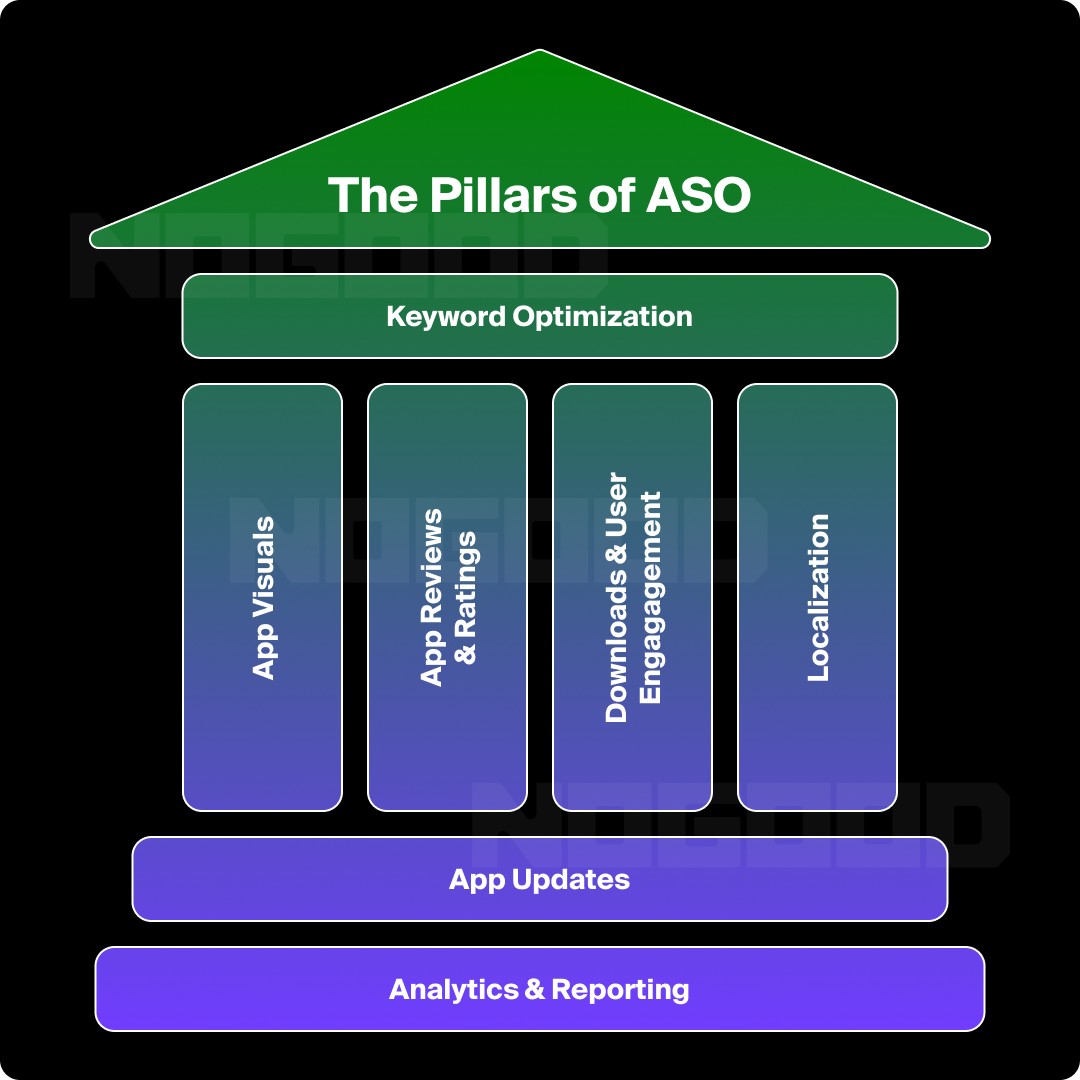
App store optimization is similar to search engine optimization (SEO) in the way that you’re optimizing your content for a search platform. The key difference is that while SEO is optimizing for search engines like Google, ASO is about optimizing for an app store’s algorithm.
Despite their platform differences, both strategies rely on foundational tactics, like keyword relevance, user engagement signals, and conversion optimization. But ultimately, ASO zeroes in on an app’s discoverability and driving installs by fine-tuning elements like app title descriptions and visual tools. Here are the principal pillars of ASO:
- Keyword Optimization: Using relevant keywords in the app’s title, description, and subtitle to improve search rankings.
- App Visuals: Including high-quality screenshots, icons, and videos to encourage downloads and showcase the app’s features.
- App Reviews & Ratings: Collecting positive reviews and ratings to increase credibility and improve rankings. Involves actively engaging with users to address concerns.
- Downloads & User Engagement: Increasing downloads and boosting retention rates to improve rankings.
- Localization: Tailoring your app’s content for different languages and regions to increase global visibility.
- App Updates: Regularly updating with bug fixes and new features to signal to app stores that the app is active and well-maintained.
Capitalizing on AI in ASO
From predictive keyword analytics to personalized creative testing, AI can help you make smarter, faster decisions based on real-time data. Leveraging AI in your ASO strategy can uncover what you might miss with 100% manual optimization.
AI-Powered Keyword Research and Optimization
Keywords are at the heart of any ASO strategy. The right keywords can drive high-quality traffic to your app, but identifying those keywords is a challenging and time-consuming process.
AI can make this process significantly more efficient by analyzing vast amounts of search data and predicting which keywords will be most impactful for your app’s ranking. AI-powered tools can track competitor keywords, search volume trends, and user behavior to provide tactical recommendations for keyword optimization.
Use tools like App Radar to gather real-time data on the most effective keywords for your app’s category. These AI tools analyze trends to uncover new keyword opportunities, helping you get ahead of competitors.
Optimizing App Metadata Using AI
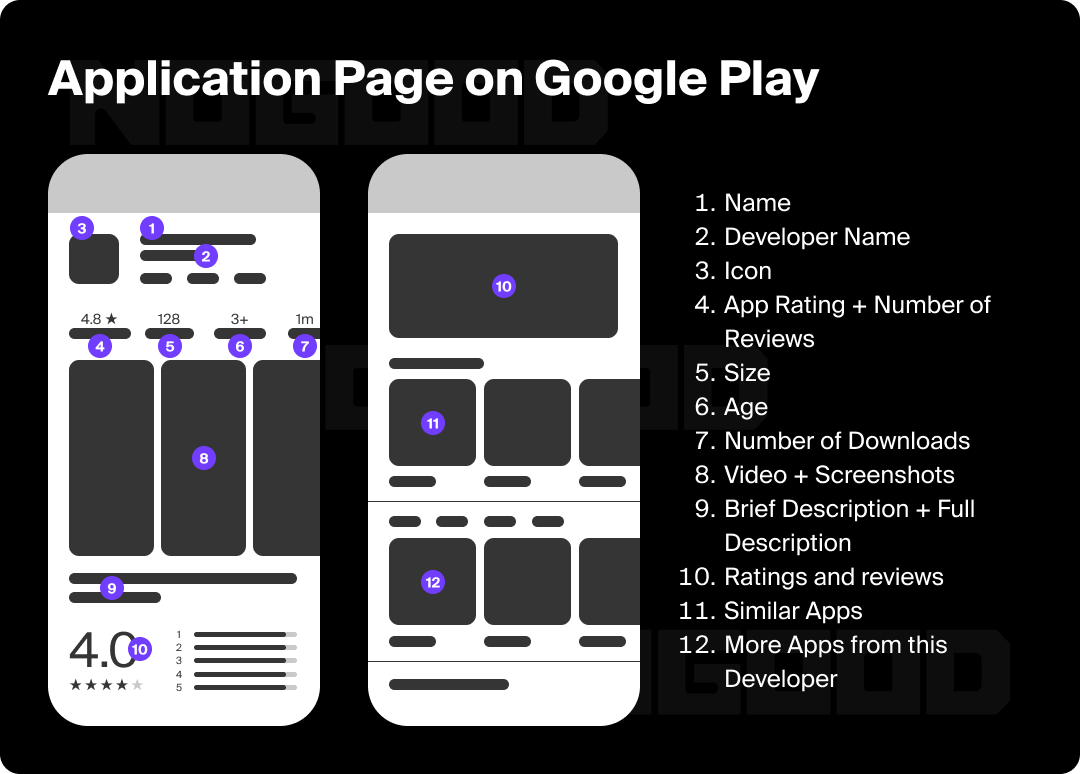
Optimizing your app’s metadata (title, description, and subtitle) is another opportunity to leverage AI. AI tools can analyze how users interact with various app descriptions and titles, testing different variations to determine which is most likely to drive downloads.
Leverage tools like SplitMetrics to conduct A/B testing on your app’s metadata. SplitMetrics utilizes AI to collect data and recommend the most effective titles, descriptions, and visual elements.
Optimizing your metadata can increase your app’s visibility and conversion rates. When your metadata is optimized, your app becomes more discoverable and appealing. The right keywords and compelling descriptions help users find it, while attractive visuals, icons, and solid ratings encourage them to actually download it.
Visual Asset Optimization
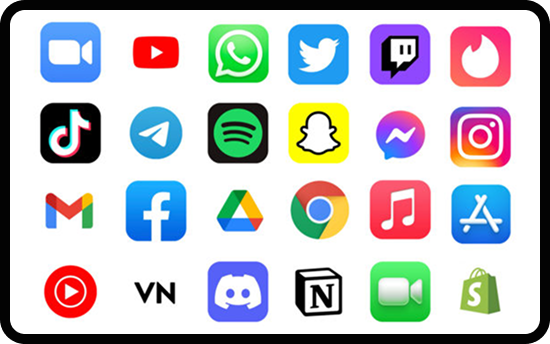
When it comes to app listings, visuals are just as important as metadata. Consumers have some pretty strong opinions about app icons, and studies have shown that consumers are more likely to download and use apps with visually appealing icons. The most popular apps’ icons reinforce their branding and visual identity. Icons, screenshots, and videos are the first things users see, and AI can help you optimize these elements and maximize user engagement.
AI platforms can assess which visual elements drive the most engagement by analyzing click-through rates, user feedback, and behavior patterns. For example, they can suggest design tweaks that align with user preferences, helping you create visuals that convert better.
Use design platforms with AI tools like Fotor to create multiple variations of your app’s icon and screenshots. Analyze performance data to determine which visuals yield the best results, and refine your designs accordingly.
Sentiment Analysis: Understanding User Feedback
User reviews and ratings are an invaluable source of information for improving your app. However, reading through thousands of reviews to gain meaningful insights can be overwhelming. AI can streamline this process by conducting sentiment analysis on user feedback.
AI-powered tools can scan thousands of reviews in real-time, categorizing them based on sentiment (positive, negative, or neutral) and identifying common themes. This allows you to prioritize improvements and better understand your users’ pain points, ultimately giving you the information you need to enhance the overall user experience.
Implement AI sentiment analysis tools like AppBot to quickly process and extract insights from user reviews. This will help you identify areas for improvement, whether it’s a bug fix, a feature request, or a tweak to your app’s interface.
AI-Powered Competitor Analysis
The app store is competitive, and staying ahead of the curve requires keeping a close eye on your competitors. AI can automate competitor analyses by tracking keyword rankings, app store visuals, and user feedback. This allows you to identify opportunities to improve your ASO strategy based on what’s working (or not working) for your competitors.
AI-powered competitor tools can provide you with real-time data on apps ranking higher than yours, revealing their keywords, user feedback, and optimization strategies.
Use tools like Sensor Tower to monitor your competitors’ performance. By understanding your competitors’ strengths and weaknesses, you’re able to uncover gaps in your ASO strategy to boost your app’s visibility and performance.
Predictive Insights
One of the most exciting aspects of AI in ASO is its ability to make trend predictions. By analyzing historical data and identifying patterns in user behavior, AI can forecast which keywords, visuals, and app features are likely to perform well in the future.
This predictive power allows you to keep up with changing user preferences to proactively adjust your ASO strategy, rather than reacting to changes after they occur.
Use predictive analytics tools like Sensor Tower’s forecast feature to gain insights into potential future trends. By adjusting your ASO strategy ahead of time, you can position your app for long-term success.
Enhancing User Retention and Engagement
While attracting users to download your app is important, keeping them engaged and retaining them is just as crucial because it directly impacts your ASO strategy. High retention and engagement signal to app stores that your app delivers ongoing value, leading to better rankings, more reviews, and increased visibility in search results and category charts.
AI can play a pivotal role in driving these engagement metrics by analyzing user behavior and providing personalized experiences that boost engagement and long-term retention, all of which feedback into stronger ASO performance.
- Personalized Push Notifications: AI can segment users based on their behavior, preferences, and usage patterns to deliver personalized push notifications. By targeting users with tailored messages or promotions, you can significantly improve retention.
- In-App Personalization: AI algorithms can customize in-app experiences like content, layout, or product recommendations based on individual preferences. A more relevant and satisfying user experience leads to higher retention and better app store ratings.
Implement tools like CleverTap to help you create personalized user journeys that increase engagement and retention.
Multi-Platform Optimization (iOS vs. Android)
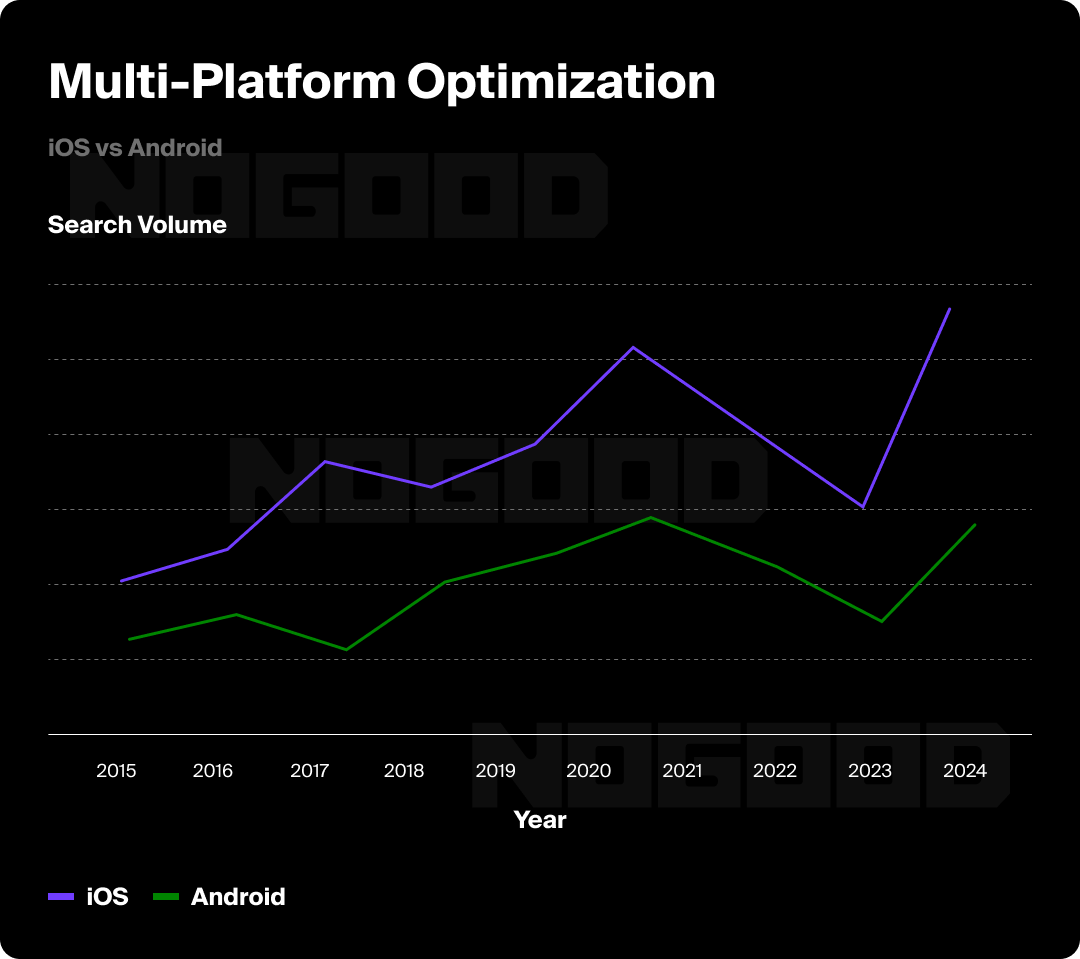
ASO differs slightly for iOS and Android, as each app store has unique algorithms, rules, and user behaviors. However, AI can help you navigate these differences more efficiently, ensuring your app’s visibility is optimized on both platforms:
- Platform-Specific Optimization: It’s crucial to tailor your ASO strategy to the unique characteristics of the Google Play Store and the Apple Store. For example, AI can analyze keyword performance, conversion rates, and user engagement data on each platform to fine-tune your metadata and visual assets accordingly, ensuring you meet the preferences of each platform.
- Cross-Platform Strategies: While platform-specific strategies are essential, AI helps streamline this process by allowing you to manage both stores without duplicating efforts. By automating and unifying your keyword research, performance tracking, and optimization tasks across platforms, AI enables you to maintain a consistent strategy that adapts to the nuances of both Google Play and the Apple App Store.
Ensure you’re tracking cross-platform keyword performance and adjust your strategy based on AI insights for both iOS and Android.
App Localization for Global Reach
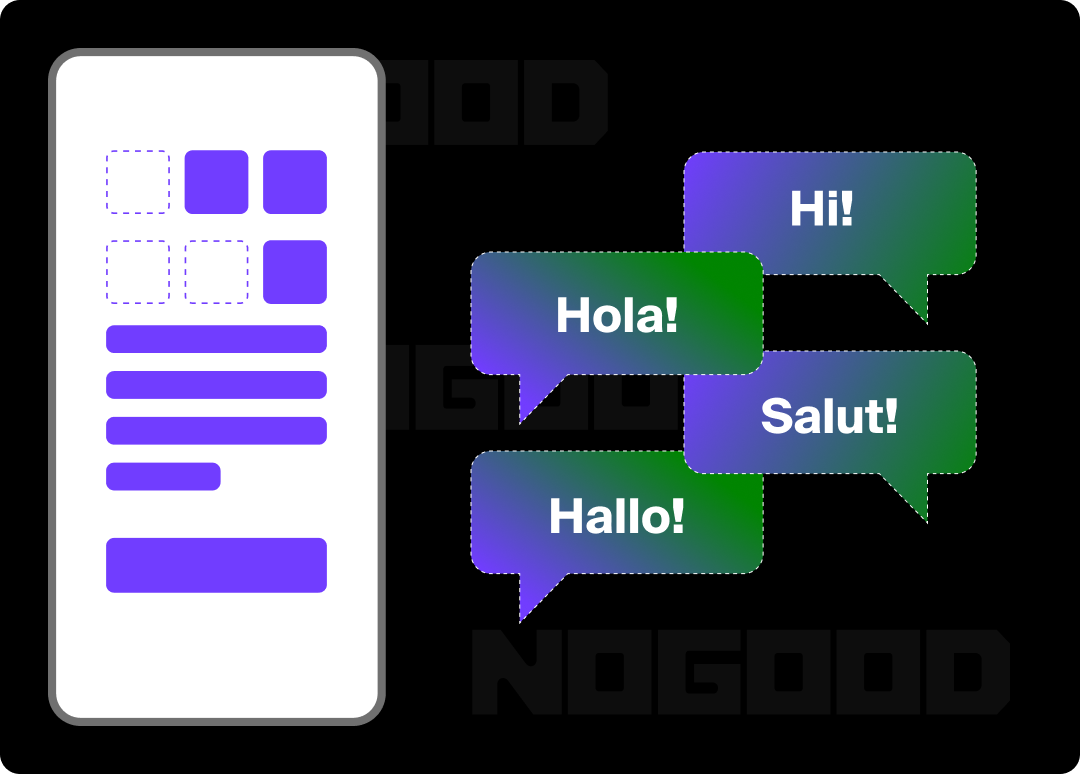
If your app targets a global audience, localization is essential. AI can help you transform app localization by automating translations, adjusting cultural nuances, and identifying country-specific keywords.
- Automated Translations: AI tools can automatically translate your app’s metadata, descriptions, and in-app content into multiple languages, ensuring it resonates with local audiences.
- Cultural Adaptation: AI can also analyze cultural preferences and adapt visuals and descriptions to fit different markets, increasing the likelihood of engagement in diverse regions.
Lokalise has recently launched an AI tool that helps streamline the process of translating and adapting your app for international markets.
Optimizing Ads for Better Performance
If you’re expanding out of an organic strategy and including paid marketing, like Apple Search Ads, AI tools can help. AppRadar, mentioned earlier in the article, also uses AI to optimize ad performance within the App Store and Google Play.
App store performance tracking tools built with AI can assist with budget allocation, audience segmentation, campaign optimization, and offer competitive insights to ensure you hit a solid ROI. These suggestions are created by analyzing user behavior, past performance data, and real-time monitoring to help you optimize every ad.
Ensure you’re leveraging AI-powered tools to track performance, adjust bids, and personalize ads in real-time for the best results in your Apple Store Ads campaigns.
Pitfalls to Avoid When Using AI for ASO
While AI can provide invaluable insights, there are a few pitfalls to avoid:
- Over-Reliance on Automation: AI should complement human expertise, not replace it. Use AI to streamline tasks and enhance decision-making, not replace it entirely. AI can provide insights, but your strategic vision, creativity, and understanding of market trends are irreplaceable.
- Data Quality Issues: The accuracy of the data you feed into AI models directly impacts the quality of the outputs. If your data isn’t accurate or representative of real user behavior, AI’s suggestions and optimizations will be based on faulty assumptions. Always ensure you’re working with clean, relevant data for the most reliable results.
- Ignoring User Feedback: While AI is powerful for surfacing patterns and sifting through large volumes of user reviews, ratings, and in-app behavior, it can sometimes miss the nuance behind why users feel a certain way. To get the whole picture, pair AI recommendations with a human lens, reading qualitative feedback, and paying attention to context. This ensures you’re not just optimizing for numbers, but addressing real user needs that can’t be captured by algorithms alone.
App-timizing for Success
Every day, over one thousand Android apps and iOS apps are published to the app stores, making it harder than ever to stand out. Do you want to stay reliant on outdated methods to enhance your app’s performance? AI can provide you with unique, data-driven insights based on near-instant analysis, allowing you to optimize your ASO strategy with precision, speed, and scalability, ensuring your app stays visible and competitive.
But don’t just rely on AI for your App Store Optimization strategy; see how NoGood has taken apps to new heights with a 300% increase in new user signups.





